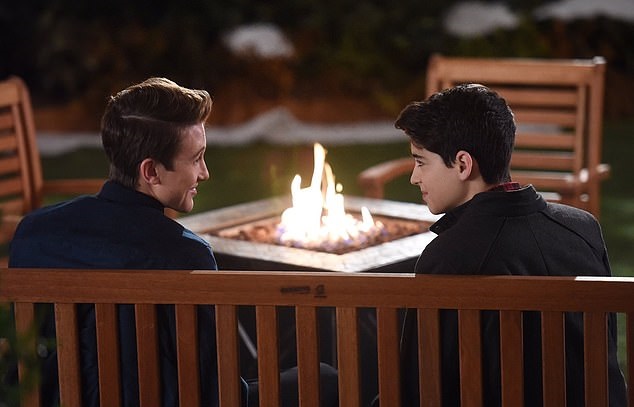‘In refusing to shy away from gay adolescent love, Disney’s ‘Andi Mack’ might just have saved young LGBTQ lives’
Hugh Kaye pays tribute to Disney Channel's first major LGBTQ teen character arc.
By Will Stroude

Words: Hugh Kaye
Welcome to an occasional series, that could be christened ‘Heroes and Villains’. I wasn’t going to start with the good guys but then I caught the final ever episode of the Disney Channel’s teen drama Andi Mack.
You might have seen stories about the show already, including the one that reveals that Cyrus (Joshua Rush, who this week came out as bisexual) ends up with former bad boy TJ (Luke Mullen).
Just before the show’s final scene, we see the pair admit to each other that they are gay and that they have feelings for each other. Staring into Cyrus’s eyes, TJ then reaches out and gently takes his new boyfriend’s hand.
It’s done in a round-about way. After revealing what his initials stand for, TJ asks: “Is there anything else you want to know? Cyrus: Is there anything else you want me to tell me? TJ: “Yeh. Is there anything you want to tell me?” Cyrus: “Yes.”
No kiss, very little said and regular viewers will probably think TJ’s full name is more surprising that what follows, but it’s still touching. And important.
In the past, Disney Channel’s output, along with other broadcasters in America, here in the UK and around the world, has aimed teen dramas at straight youngsters. The main characters are heterosexual and any angst or worries have tended to surround girl meets boy, trouble ensues, girl gets back with boy.

And while, to an extent, Andi Mack focused on heterosexual characters, Cyrus was never side lined. His sexuality was probably mentioned as much as his religion. Both were just facts of (his) life.
You could argue that his sexuality wasn’t mentioned enough but Joshua Rush, who portrayed him, wasn’t silent on social media, telling one homophobe who thought the storyline was a poor example to young adults: “Gay kids are gonna exist, and we need to support [them] in any way we can.” He added that not allowing gay kids to have a voice could be highly damaging to them.
And just after the finale aired in the US, Mullen wrote on Twitter: “Honoured to be a part of such a ground-breaking show. I hope my character can inspire people to be proud of who they are and love who they love.”
At 17, Joshua is three years older than the his alter-ego Cyrus, while Luke turns 18 next month. But that didn’t stop conservative groups – such as One Million Moms, whose members celebrate online whenever they claim to have secured the cancellation of a show they deem to be “indecent” – airing their horror that two teen boys could be in love.
Although the show has since been cancelled, after three series and 57 episodes, Disney stood its ground.
When I was growing up in the Dark Ages, well, OK, the Sixties and Seventies – but believe me dark, dark ages for gay representation on TV – that would never have happened.

More often than not, gay characters were either stereotypically overly effeminate characters to be pitied or laughed at in comedies (John Inman’s Mr Humphries in Are You being Served? – just in case you didn’t realise his sexuality, his first names were Wilberforce Claybourne and he lived with his mother) or miserable, vicious, jealous psychopaths (a lesbian in The Asphalt Jungle; a ‘transvestite’ in Alfred Hitchcock Presents; a gay man in Dan August) who die, often horribly, by the end of a drama.
For good measure, there were the ones who were going to turn their friends gay (Judd, for the Defense) and the ones who were “ill” (Marcus Welby MD). On the big screen, we had Rod Steiger in The Sergeant, who, having kissed a younger recruit, has to shoot himself. We even had the two mincing hit men in the James Bond film Diamonds are Forever. Just before one of them dies, he enjoys having his balls squeezed – as we all do…
Little wonder some of my peers had trouble coming to terms with their sexuality – hell, one is a very vocal Trump supporter!
Although as time went on we started to see more gay characters on TV, and they were portrayed more sympathetically, they tended to be mainly adults – and certainly older than Cyrus and TJ.
That 14-year-old boys can love each other might be horrifying to the bigots at One Million Moms, but, as singer Ronan Parke reminded us when came out publicly in an interview with Attitude earlier this year, for many of us, the realisation comes at the same time as our straight counterparts.
Of course, all this is four years after the ‘Jonner’ ‘controversy’, when 13-year-olds Jude and Connor shared a sweet kiss on US family drama The Fosters (not, for some unaccountable reason, shown in the UK).
But, for giving us ‘Tyrus’, helping questioning teens through what could be a difficult time – and maybe even saving young lives – Disney Channel and those involved in the making and production of Andi Mack, still get the first of our ‘hero-grams’.
